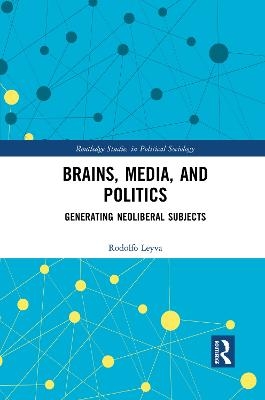
Brains, Media and Politics
Generating Neoliberal Subjects
Seiten
2021
Routledge (Verlag)
978-1-032-08368-1 (ISBN)
Routledge (Verlag)
978-1-032-08368-1 (ISBN)
This book combines leading theories from sociology, media-communications and cognitive science, and draws on a unique mix of qualitative and quantitative evidence to provide a nuanced account of how the cognitive dimensions of people’s everyday social practices contribute to the macro processes of neoliberal reproduction.
Following the 2007–2008 global financial crisis, a number of prominent academics, journalists, and activists were quick to pronounce the demise of neoliberal capitalism and governance. This rather optimistic prediction, however, underestimated the extent to which neoliberalism has shaped the 21st-century world order and become entrenched in our sociopolitical and cognitive fabric. Indeed, 11 years after the crisis, and in spite of the significant levels of socioeconomic inequality, psychological distress, and environmental destruction generated by neoliberal policies and corresponding business and cultural practices, the ideological hegemony of neoliberalism has not been supplanted, nor has it really faced any serious unsettling. How, then, has neoliberalism inflected and shaped our “common-sense” understandings of what is politically, economically, and culturally viable? To help answer this question, this book combines leading theories from sociology, media-communication research, developmental psychology, and cognitive science, and draws on primary evidence from a unique mix of ethnographic, survey, and experimental studies – of young people’s leisure practices and educational experiences, of young adults’ political socialisation processes in relation to exposure to social networking sites, and of the effects of commercial media viewing on material values and support for social welfare. In doing so, it provides a nuanced and robustly empirically tested account of how the conscious and non-conscious cognitive dimensions of people’s subjectivities and everyday social practices become interpellated through and reproductive of neoliberal ideology. As such, this book will appeal to scholars across the social and behavioural sciences with interests in neoliberalism, political engagement, enculturation, social reproduction, and media effects.
Following the 2007–2008 global financial crisis, a number of prominent academics, journalists, and activists were quick to pronounce the demise of neoliberal capitalism and governance. This rather optimistic prediction, however, underestimated the extent to which neoliberalism has shaped the 21st-century world order and become entrenched in our sociopolitical and cognitive fabric. Indeed, 11 years after the crisis, and in spite of the significant levels of socioeconomic inequality, psychological distress, and environmental destruction generated by neoliberal policies and corresponding business and cultural practices, the ideological hegemony of neoliberalism has not been supplanted, nor has it really faced any serious unsettling. How, then, has neoliberalism inflected and shaped our “common-sense” understandings of what is politically, economically, and culturally viable? To help answer this question, this book combines leading theories from sociology, media-communication research, developmental psychology, and cognitive science, and draws on primary evidence from a unique mix of ethnographic, survey, and experimental studies – of young people’s leisure practices and educational experiences, of young adults’ political socialisation processes in relation to exposure to social networking sites, and of the effects of commercial media viewing on material values and support for social welfare. In doing so, it provides a nuanced and robustly empirically tested account of how the conscious and non-conscious cognitive dimensions of people’s subjectivities and everyday social practices become interpellated through and reproductive of neoliberal ideology. As such, this book will appeal to scholars across the social and behavioural sciences with interests in neoliberalism, political engagement, enculturation, social reproduction, and media effects.
Rodolfo Leyva is a fellow in the Department of Media and Communications at the London School of Economics and Political Science, UK.
Introduction 1. Homo Economicus & The Neoliberal Society 2. Neoliberal Cognition, Subjectification, & Reproduction 3. Reproducing Neoliberalism in Everyday Life: A Cross-National Ethnographic Study 4. How New Media Help Generate Neoliberal Subjectivities: A Survey Study 5. Experimental Insights into Mass Media’s Cultivation of A Neoliberal Habitus 6. A Cognitive-Sociological Theory of Neoliberal Reproduction
| Erscheinungsdatum | 01.07.2021 |
|---|---|
| Reihe/Serie | Routledge Studies in Political Sociology |
| Zusatzinfo | 13 Illustrations, black and white |
| Verlagsort | London |
| Sprache | englisch |
| Maße | 156 x 234 mm |
| Gewicht | 317 g |
| Themenwelt | Geisteswissenschaften ► Psychologie ► Entwicklungspsychologie |
| Sozialwissenschaften ► Politik / Verwaltung | |
| Sozialwissenschaften ► Soziologie | |
| ISBN-10 | 1-032-08368-9 / 1032083689 |
| ISBN-13 | 978-1-032-08368-1 / 9781032083681 |
| Zustand | Neuware |
| Informationen gemäß Produktsicherheitsverordnung (GPSR) | |
| Haben Sie eine Frage zum Produkt? |
Mehr entdecken
aus dem Bereich
aus dem Bereich
Vormals Oerter & Montada
Buch | Hardcover (2018)
Julius Beltz GmbH & Co. KG (Verlag)
CHF 89,60
Grundlagen, Diagnostik und Therapie vom Säuglingsalter bis zum alten …
Buch | Hardcover (2022)
Klett-Cotta (Verlag)
CHF 68,60
Deutsche Auflage unter Mitarbeit von Sabina Pauen
Buch (2022)
Springer (Verlag)
CHF 83,95


